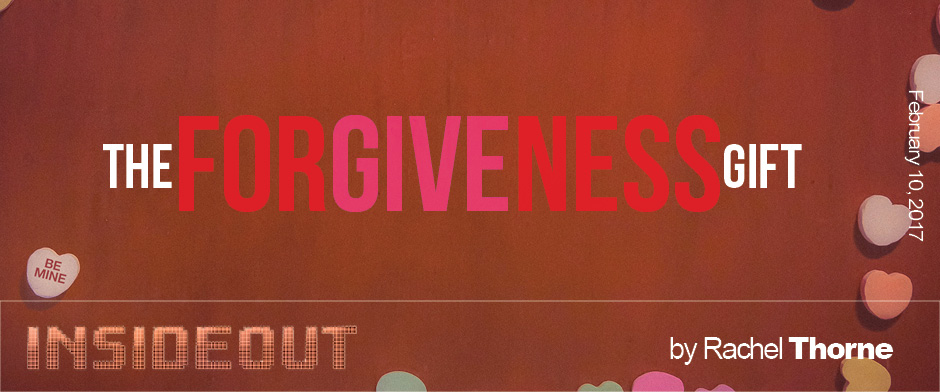The Forgiveness Gift

In my reading not long ago, the Lord opened my eyes to a simple, yet powerful concept. That morning, I opened my heart a little wider as I re-opened a gift that was purchased long ago. I’m not sure why it never stood out to me, but depending on the tense where forgiveness is used, “give” and “gave” are found in the word itself.
Forgiving is the intentional act of not harboring hurt and hate or feeling like you are owed something. Rather it is a choice you make to give, even in the face of crippling offenses. It is a decision to give another chance, to love, to turn the other cheek, and to let go.
When you forgive, you stop expecting the other person to compensate. Instead you offer love in the face of what scarred you most. You make the resolution to move on and not remain stuck in a cycle that will only drag you further than you are prepared to go.
Think of all the lessons we learn about this simple, yet profound concept throughout the Scriptures. If you look for even a short amount of time, you can see the intensity and amount of forgiveness that is shown chapter after chapter. The gospels share the story of the prodigal son’s return home after sinning and running from what was right. His father didn’t turn him away or make him beg his way back in. Instead he gave the choicest of goods to his precious son. He gave a lavish party even though the son was undeserving.
After Joseph’s brothers had betrayed him and enviously sold him into slavery, Joseph extended mercy when he could have issued punishment years later. Instead of harboring the pain they brought him, he was moved with compassion.
“But Joseph said to them, ‘Do not fear, for am I in the place of God? As for you, you meant evil against me, but God meant it for good, to bring it about that many people should be kept alive, as they are today. So do not fear; I will provide for you and your little ones.’ Thus he comforted them and spoke kindly to them” (Genesis 50:19-21).
The woman caught in the act of adultery was not condemned, although her sins were punishable by death in the eyes of society. Jesus made an example through this story of brokenness and deceit. We all sin differently than each other, therefore who are we to cast judgment or to withhold compassion?
“Jesus bent down and wrote with his finger on the ground. And as they continued to ask him, he stood up and said to them, ‘Let him who is without sin among you be the first to throw a stone at her.’ And once more he bent down and wrote on the ground. But when they heard it, they went away one by one, beginning with the older ones, and Jesus was left alone with the woman standing before him. Jesus stood up and said to her, ‘Woman, where are they? Has no one condemned you?’ She said, ‘No one, Lord.’ And Jesus said, “Neither do I condemn you; go, and from now on sin no more” (John 8:6-11).
No matter what chapter or verse you find yourself immersed in, you will discover shadows and echoes of sympathy and examples of the utmost importance of the gift that keeps on giving.
How then are we to forgive? We have these examples and many others, but one particular area from which we can take direction is Matthew 18:21-22.
“Then Peter came up and said to him, “Lord, how often will my brother sin against me, and I forgive him? As many as seven times?” Jesus said to him, “I do not say to you seven times, but seventy-seven times.”
This passage goes on to tell the parable of the unforgiving servant and how one who was released with pardon became the very same man to demand what he was owed and show no leniency. He was punished for his actions and became yet another example for those after him. “So also my heavenly Father will do to every one of you, if you do not forgive your brother from your heart” (Matthew 18:35).
An even greater story than all of these is that of our Savior on the cross. He not only gave His own life for us, but He made the choice to forgive and never stop providing. As they hit Him, scourged Him, mocked and falsely accused Him, He stayed there—on the cross we deserved. He even pleaded on behalf of the ones treating Him harshly. “Then said Jesus, Father, forgive them; for they know not what they do” (Luke 23:34). Not only did He do all of this, but the sinner that hung beside Him on the cross was invited into paradise with Him. A man who was accused of an iniquity punishable by death was one of the first men to see the Kingdom. If that doesn’t speak of receiving the gift of extreme, undeserved forgiveness, I’m not sure what does.
Too often I grasp firmly with closed hands what Jesus took and forgave with outstretched arms. I know it seems easy sometimes to harbor and take instead of give and release, but maybe it is time to give this gift that not only benefits the receiver but also the giver. It may be difficult, but it is more than necessary. “Freely you have received; freely (for)give.”
Rachel Thorne was born in Florida and has lived in many places throughout the United States. She is a graduate of Urshan College, formerly known as Gateway College of Evangelism. She wants to make a difference and change her world. Rachel is actively seeking the will of God for her life and is willing to do whatever He has for her.









